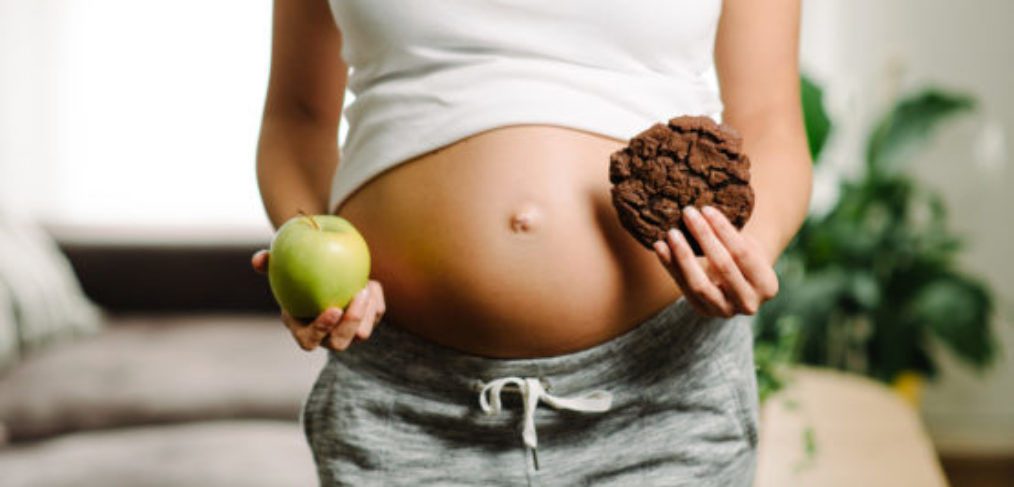Changing the Scope of What Pregnant Women Are Advised to Eat

“Eating for Two”? Thinking pregnancy is a time to simply get in more calories, regardless of the source?
Or maybe it’s more like, “everything in moderation”?
It’s hard enough to decipher how to eat when it’s eating for one (a woman who isn’t pregnant… or a man). But when the ante is upped and what you’re eating directly affects the development of another being, the confusion increases incrementally.
So when you’re in a new situation, you turn to an expert for advice, right?
Back when I started racing triathlon, I devoured magazines (this is pre-internet), books and learned from the then brand new club in the area, before it was even called LA Tri (it was triathlete zombies back in the day!).
Point is, I sought expert advise.
I made mistakes along the way, you can be sure of that, but I managed to improve steadily but slowly over a long period of time. Something was working, I had time on my hands since this was something I was doing for sheer enjoyment and there wasn’t really anything at stake.
But what do you do if you’re in a whole new circumstance and the advice you’re given by what should be that trusted expert raises some red flags?
This is precisely what occurred at my first OB/GYN visit after confirmation I was pregnant, as I’ve shared in past posts.
I’m a bit of an anomaly here; having the good fortune to be able to practice what I love for a living- educating others on the importance of what we eat and they body of health we are subsequently able to create, so being able to send a quick email or make a fast phone call to ease any concerns I may have had about whether or not it would behoove me to modify what I eat at all was a gift at my disposal.
But then, I thought in horror, what about the millions of women who, like so many Americans and those in other countries who are now adopting the horrible eating patterns we have here, are unsure of what and how much to eat during pregnancy, who literally fall victim to the antiquated advice given out under the umbrella of sound pregnancy nutrition?
Even I have experienced the feeling of being uncomfortable (but still doing so) speaking my mind in a doc’s visit, so how must one feel who might not have the confidence to ask questions?
Wasn’t there even a single resource for pregnant women out there to get a breath of fresh air and maybe (fingers crossed) get some sound alternatives to the USDA’s recommendations for what to eat during this crucial stage of life, when time is absolutely of the essence?
And with serious consequence if mistakes are made, unlike my example of learning about triathlon, no less.
I would like to be that resource, but given this is my first pregnancy, and I’m learning as I go, too, it will take some time before I am equally as well versed in advising on pregnancy nutrition as I am in ‘how to be a successful paleo / keto endurance athlete’.
Until very recently, to my knowledge, there was no body of work to rely upon to provide legitimate, fact-based research to spell out in detail what a pregnant woman who just doesn’t buy the mainstream advices would be best served eating.
Thankfully, this is no longer the case.
Lily Nichols (1), who holds the credentials of being a registered dietician / nutritionist, has created a body of work that I believe is an absolute must-read for any pregnant woman.
When I began searching for reliable, authentic resource upon which I might rely to glean some solid, fact-based information for a women who prefers to eat real food (not food byproducts which come highly recommended by the USDA), ample fat and promote an optimal gut biome for her developing baby, answers were few and far between.
Fortunately, I learned about the research of a pioneer in her field, recommended by Robb Wolf, who was bucking the system by (gasp) recommending an authentic, ancestral eating regime for expectant mamas.
While she doesn’t go so far as labeling the recommendations as ‘Paleo’ or ‘Keto’, which is probably a good thing, given how confusing and silly these labels have become, in effect, real, whole foods which are suggested, each with a common-sense, rational reason for why it makes sense to include these foods, are, in essence those which are commonplace in an authentic paleo inspired approach.
Once I learned about her work, I bought her second book, Real Food for Pregnancy, (2) immediately and later learned it was her second piece, the first being one dedicated to prevention and treatment of GD (gestational diabetes), once again, through food, Real Food for Gestational Diabetes (3).
I was sold before I even began the book itself; by page five of the intro, in which she does a side by side comparison of a conventional nutrition sample meal plan, one which would be recommended by the USDA as well as many US-trained, Western Med based docs to what she calls a Real Food for Pregnancy sample meal plan.
This is followed by a table in which a comprehensive micro and macronutrient breakdown is offered.
While the plans are similar in total caloric recommendations, the findings were that the Real Food meal plan topped out on nutrient density across the board.
If you’ve been following an authentic Paleo approach all along, the findings and guidelines in the book will not surprise you and in fact, they very well may be that little extra measure of assurance you may seek in ensuring what you’ve been putting in your body is precisely the very same whole food that will provide optimal nutrition for your growing baby.
If, on the other side, you’ve sought nutrition advice in an effort to become healthier yourself during pregnancy, are hoping to prevent GD or simply don’t quite buy the advice doled out to you at your biweekly 10 minute OB visit (such as one of the many sage pieces of advice I got: take a baby aspirin each day to ensure adequate blood flow to the placenta), I highly recommend this book.
In her book, Lily put it best when she wrote that “depriving a mother’s growing baby of key nutrients needed for things like brain development* goes against the ‘first, do no harm’ principle that is central to ethical, global medical care”.
Why wouldn’t any mom do anything and everything she can to promote ideal brain function, gut health, decrease incidences of certain diseases and increase chances of using epigenetics to render favorable outcomes even in cases when babies have specific genes dictating higher risks of certain health issues?
It’s a no brainer and it’s common sense.
And so is all the invaluable information in this book.
Can’t recommend it highly enough!
*The conventional sample meal plan indicates low levels of of choline and Vitamin A, essential for brain development.





